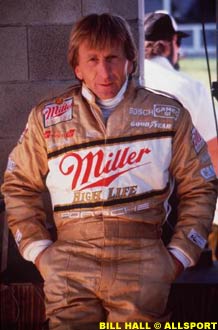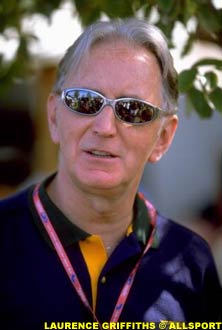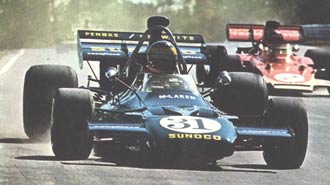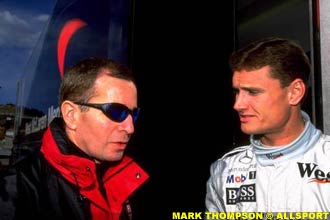Although many Formula One fans ultimately gather the money and time for a trip of a lifetime to a Grand Prix, most of the 300 million individuals in over 200 countries (the FIA's broadcasting statistics) who cannot go to the track that day are consigned to watching the races on TV. What most end up doing is listening to expert commentators, many of them former Formula One drivers, pontificating on who is up and who is down, who can drive and who should be shown the door. Generally, these commentators try to enliven and translate what is coming across from the so-called "world feed", supplied by the originating producer at each circuit.
Where are these talking heads located? Some of these commentators are actually at the track in a booth, such as Murray Walker and Martin Brundle of ITV; others are in Bernie's Digital TV Media Production Center, broadcasting live to the Benelux countries. Still, others are in their home countries in a TV studio, watching the same pictures as we are, supplemented by timing and scoring, and by people "on the ground" at the circuit who are on the telephone line phoning in tidbits from the media facilities trackside. Another variant is a combination of remote commentators and a live pit reporter doing a walkabout.
For most people not familiar with Formula One's many intricacies, watching a race is like watching paint dry. However, many of these ex-drivers as expert commentators add a great deal of enjoyment for Grand Prix viewing, especially for the casual fan. On other occasions, they are simply annoying, frustrating and often wrong, while simultaneously caught up in their own self-importance.
In the days when Grands Prix were first shown on TV in the United States, we were spoiled at the outset by being exposed to what would turn out to be the Best and the Brightest of commentators in a Golden Age of Grand Prix. Phil Hill, Stirling Moss and, later on, Jackie Stewart were color commentators for the black and white live coverage of the Monaco Grand Prix. All three were articulate, knowledgeable and great drivers in their time. Indeed, ABC Sports should resurrect the footage from those years and re-release them as a video - they were that good.
But, while the credentials of Hill, Moss and Stewart are unassailable, the current group of commentators is, in the main, a much less accomplished lot of ex-Grand Prix drivers, though you would not always suspect that from listening to them. Did you ever wonder how these experts performed when they were in the cockpit of a Formula One car? Here are the statistics to bear in mind the next time one of them calls Jean Alesi to task for 'brain-fade'; questions the morality of Michael Schumacher's driving tactics; or the mental strength of Mika Hakkinen.
USA: Fox Sports Net - Derek Bell and John Watson
Fox Sports Net reaches more than 68 million TV sets in the United States, and Derek Bell is the principal Formula One expert commentator.
With regards to his Formula One experience, Bell had a relatively short stay in Grand Prix cars, driving sporadically from 1968-1974. However, he distinguished himself later on in sports cars and at LeMans, particularly in the Porsche 956, and still drives competitively at almost sixty years of age.
 Bell is your basic charming, funny, self-effacing, well-informed British gentlemen and, somewhat unusually in this business, is willing to admit when he is wrong - which isn't too often. He sometimes draws with reverence on his brief career with the Ferrari team during the 1968 season (and even on his relationship with Enzo Ferrari), when he participated in the United States and Italian Grands Prix, teamed with Chris Amon and Jacky Ickx in the Ferrari 312.
Bell is your basic charming, funny, self-effacing, well-informed British gentlemen and, somewhat unusually in this business, is willing to admit when he is wrong - which isn't too often. He sometimes draws with reverence on his brief career with the Ferrari team during the 1968 season (and even on his relationship with Enzo Ferrari), when he participated in the United States and Italian Grands Prix, teamed with Chris Amon and Jacky Ickx in the Ferrari 312.
In all, Bell participated in 16 Grands Prix between 1968 and 1974 but started in only nine. His best finish in a Grand Prix car was sixth in a Surtees-Ford during the 1970 US Grand Prix at Watkins Glen amongst some heady company: Emerson Fittipaldi, who won the race, Ronnie Peterson, Jack Brabham, Denny Hulme and other luminaries who finished behind Bell. Derek Bell also happened to be at Hockenheim that day in April 1968 that Jim Clark was killed in that infamous Formula 2 race. So, he knows those from the olden days and his commentary benefits from that long-term perspective.
John Watson, an Ulsterman from Northern Ireland and proud of it, also makes periodic appearances on Fox Sports Net. Watson, now 54, participated in 154 Grands Prix and won 5 of them.
His career had some interesting highlights: he won the Austrian Grand Prix at the Osterreichring in 1976 for Roger Penske, the only victory in Formula One for Penske in 40 starts. He also won his own British Grand Prix in 1981 for McLaren, won two times in the United States (at Detroit in 1982 and at Long Beach in 1983), and finally, Watson won the tragedy-tinged Belgian Grand Prix of 1982 at Zolder, the race where Gilles Villeneuve was killed during qualifying. He also had two poles and five fastest laps, so he was no slouch.
 Notwithstanding the incredible achievement of Rubens Barrichello at the recent Grand Prix of Germany to come from 18th place on the grid to win the race, Watson holds the all-time record for comebacks: he came from 22nd to first place to win the US West Grand Prix at Long Beach in 1983.
Notwithstanding the incredible achievement of Rubens Barrichello at the recent Grand Prix of Germany to come from 18th place on the grid to win the race, Watson holds the all-time record for comebacks: he came from 22nd to first place to win the US West Grand Prix at Long Beach in 1983.
Watson seems to be an alternate commentator on American TV coverage for Fox Sports Net (previously he had been a regular on ESPN and Eurosport) and may have appearances elsewhere from time to time. Wherever he is, however, consider yourself lucky to have him.
While his high, husky, Irish voice and accent is somewhat jarring at 7:00AM on Sunday morning, he is passionate about the sport, serious about covering it, knows everything and everyone and delivers his commentary with total professionalism. Watson resists ad hominem attacks on particular drivers, though he lost his patience with Ricardo Rosset in the huge 12-car pile up at Spa in 1998. He practically called him an idiot for piling into the group of mangled cars. Obviously, he thought Rosset should and could have avoided the disabled wreckage in front of him.
In one of the last Argentinian Grands Prix, Watson did something novel: he had Stirling Moss on a call from London, into the live coverage. Moss stayed on the line with Watson and the viewers for much of the race, while simultaneously watching on the television at home - truly a class act by two people who know and love the sport. In fact, Stirling still knows his stuff as he did back in the Sixties, when he first became a commentator. I cannot imagine why he has not been picked up on a steady basis by one of the networks somewhere.
Somewhat uniquely for these days of being limited to the world feed, Fox Sports Net also boasts a man on the ground component - Peter Windsor, who, though not a driver himself, managed the Williams Team during the tempestuous and successful 1991-92 years, which ultimately led to Nigel Mansell's World Championship.
Between Peter Windsor's interviews in the paddock (including insider reportage as to pit lane gossip) and Derek Bell's race analysis, the Fox Sports Net group does an entertaining job in covering Formula One, particularly considering the contractual restraints they operate under: most of the races are on a tape delay and there is no televised qualifying, just brief excerpts in the pre-race show.
Mike Joy, a refugee from NASCAR, rounds out the Fox Sports team. Joy is still learning the ropes and tries to raise questions he thinks any average Formula One fan would ask. To their credit, Fox Sports Net encourages constructive and interactive criticism and recently had an interesting segment responding to e-mails received from the fans.
USA: Speedvision - David Hobbs and Sam Posey
Speedvision is a satellite channel in the United States that is growing in popularity. It is currently available in more than 15 million homes and covers all the important things in life other than spouses, children and family pets: Formula One, boats, planes and motorcycles. Speedvision was organized by executives formerly with ESPN, the network that had the TV rights to Formula One in the USA for most of the Nineties and set the standard for US coverage, then and now. In other words, the organizers have a pedigree in covering Formula One, and it shows; qualifying is shown live, as is the race, with pre-and post-race coverage, including the complete press conference.
 David Hobbs, now 61, and also English, leads the coverage. As with Derek Bell, Hobbs had a short career in Grand Prix racing, but a successful career otherwise, particularly with the BMW sports and touring cars. During his time driving in Grands Prix from 1967 through 1974, he participated in six events for BRM, Honda and McLaren. His best finish was 7th for McLaren in Austria in 1974 (having qualified way back in 17th), where he was a teammate of Emerson Fittipaldi and Denny Hulme.
David Hobbs, now 61, and also English, leads the coverage. As with Derek Bell, Hobbs had a short career in Grand Prix racing, but a successful career otherwise, particularly with the BMW sports and touring cars. During his time driving in Grands Prix from 1967 through 1974, he participated in six events for BRM, Honda and McLaren. His best finish was 7th for McLaren in Austria in 1974 (having qualified way back in 17th), where he was a teammate of Emerson Fittipaldi and Denny Hulme.
Hobbs had the somewhat singular distinction of racing for Honda when it was a constructor. In his one race for Honda at Monza in 1968, he finished a respectable 9th in his Honda 3.0 V12 in a race of high attrition. Team leader John Surtees finished 17th due to an accident. Hobbs went out too when the V12 gave up but lasted longer than most.
Like Bell, despite the few races he ran, Hobbs is a link with the Ghosts of Grands Prix past because he walked among the titans of that era. Teamed with Surtees at Honda, Fittipaldi and Hulme at McLaren and Jackie Stewart at BRM (when BRM was represented by 4 cars for the 1967 British Grand Prix), he drove with the best. The list also includes Jim Clark, Jack Brabham, Graham Hill and Jochen Rindt. His distinguishing characteristic as a driver was that he always seemed to improve upon his qualifying position when it came to the race, and he knew how to keep a car in one piece and finish the race. With this rich and varied background, having Hobbs behind the microphone is like having an oral historian watching the race with you.
Hobbs also has a droll sense of humor, a touch of cynicism in his take on Formula One, and an impressive command of the history of Formula One when he chooses to display it. Hobbs also occasionally hosts the so-called "Legends of Motorsports" segments on Speedvision that focus on key events, people and races in Grand Prix history. The depth of his knowledge shines through in these programs along with his genuine love of the sport.
Prior to coming to Speedvision, Hobbs and American Bob Varsha - a lawyer turned motorsports TV commentator, who is widely respected throughout open wheel and sports car racing - teamed up in their ESPN days to turn in arguably the best commentary seen in the US. Now, they are doing it again, live on Speedvision, albeit under more difficult circumstances, since they no longer actually go to the races, as they often did when at ESPN.
Sam Posey, 56, and an American, has joined the old Hobbs-Varsha team to round out the Speedvision team. It turns out that both Posey and Hobbs were in the 1971 US Grand Prix at Watkins Glen, where Posey qualified 19th in a Surtees-Ford (teamed with Mike Hailwood and Surtees himself), finishing in 26th, and Hobbs qualified 22nd in his McLaren-Ford and finished 10th. Posey also participated in his second (and last) Grand Prix at the Glen in 1972, also in a Surtees-Ford, qualifying 23rd, but finishing 12th.
If Hobbs is self-effacing, Posey is at the other end of the spectrum - waxing poetic about all manner of things, some relevant, some not, with a penchant for stepping all over other people's lines to re-state the obvious before anyone else can. He is also a kind of a "Chatty Cathy" and seems overly titillated by the rumor de jour that is being spread along the pitlane. But, his credentials as the House Intellectual and Poet Laureate are sufficiently strong that we put up with his frivolous side.
The Speedvision producers are wise to have Hobbs-Varsha-Posey as a trio. When Varsha was off on-assignment for the Monaco Grand Prix, the broadcast just did not quite seem to jell: Varsha is the glue that holds the other two together. Interestingly, however, when Hobbs and Posey were off covering LeMans during the Montreal Grand Prix, Varsha was teamed with Steve Matchett, an ex-Benetton team mechanic. That non-Ex-F1-driver duo probably gave us the most informed and entertaining coverage all year.
To their credit, both Hobbs and Posey also raced at Indy, where both finished a career-best 5th. Hobbs drove in 1974 for McLaren and Posey in 1972 driving an Eagle-Offy, when he qualified a credible 7th. It was Posey's only Indy 500; Hobbs raced there four times in all. Accordingly, we can expect Hobbs and Posey to have their share of Indy war stories stored up for the upcoming broadcast of the US Grand Prix at Indianapolis.
ENGLAND: ITV - Martin Brundle
If Hobbs and Posey are relative tyros at Formula One though they talk a good talk, Martin Brundle is the most experienced by far of the current group, having started 158 Grands Prix between 1984-1996. Indeed, I saw him drive the McLaren two-seater on a demonstration run at Hockenheim in 1998 and he still looked fast to me - only 2 seconds off the slowest time on the grid in this heavier car.
 In 1992, Brundle, also a Brit, now 41, finished second in his Benetton-Ford to Senna in the McLaren-Honda at the Italian Grand Prix, just ahead of his Benetton teammate Michael Schumacher, then a relative rookie. Brundle was second again at Monaco in 1994 for McLaren-Peugeot, this time behind winner Schumacher, during that dark period after the death of Senna and Roland Ratzenberger at Imola and Karl Wendliger ending up in a coma at Monaco. Other than these career bests, Brundle had lots of mechanical failures and some unforced errors that led to retirements but, when he finished, it was often in the top ten.
In 1992, Brundle, also a Brit, now 41, finished second in his Benetton-Ford to Senna in the McLaren-Honda at the Italian Grand Prix, just ahead of his Benetton teammate Michael Schumacher, then a relative rookie. Brundle was second again at Monaco in 1994 for McLaren-Peugeot, this time behind winner Schumacher, during that dark period after the death of Senna and Roland Ratzenberger at Imola and Karl Wendliger ending up in a coma at Monaco. Other than these career bests, Brundle had lots of mechanical failures and some unforced errors that led to retirements but, when he finished, it was often in the top ten.
Brundle drove for virtually every team in the pitlane during his era, including Tyrrell, Zakspeed, Williams (a one-off), Brabham, Benetton, Ligier, McLaren and finally Jordan. So, unlike Bell and Hobbs, Brundle knows modern Formula One and reportedly is David Coulthard's manager. Between keeping Murray Walker coherent and guiding Coulthard, he is at the very thick of things, which is reflected in the knowledgeable reporting I have heard from him when I have been abroad. To me, Brundle is almost as good as Simon Taylor, an earlier BBC Formula One commentator, who somehow managed to combine the scholarship and literary quality Posey is shooting for with a down and dirty knowledge and love of the sport of a Murray Walker. Taylor still does radio spots for the BBC on Formula One but his principal job is to be Chairman of Haymarket Magazines, the publishing house that puts out F1 Racing and Autosport. He also writes a column for MotorSport.
GERMANY: RTL - Niki Lauda and Christian Danner
I don't speak German but the RTL feed of the Formula One races is very accessible on the internet (the commercials by the way go on longer than they do on Fox Sports and Speedvision and are equally insipid), and I have noticed Niki Lauda appears on the RTL set during most of the races with some civilian commentators: he is not my favorite driver, but, knowing Niki, I am sure the commentary is pungent and to the point, since he has never been accused of beating around the bush. I leave it to our German/Austrian contingent to let us know how he does as a commentator.
As a three-time World Champion, having done it with the top teams - McLaren and Ferrari - and both before and after his horrific fiery accident at the Old Nurburgring in 1976, the 51 year-old Austrian, above all the rest, has the credentials to know whereof he speaks.
I gather that Christian Danner, a 42 year-old German, is also a decent commentator for RTL. Danner's career in Formula One is longer than Hobbs and Bell but shorter than Brundle's. Like Brundle, Danner was with several teams (Zakspeed, Osella, Arrows and Rial) and participated in 35 races between 1985-89. His best finish was an impressive 4th at the US Grand Prix at Phoenix in 1989 when only 9 cars were running at the finish, most a few laps down. Danner had qualified dead last that day in 26th place, so you can assume that he knows the highs and lows of being a Grand Prix driver. I have seen him diligently interviewing people on the pitlane, presumably for his telecast later on but, again, I don't speak German so I cannot comment on how he calls a race.
AUSTRALIA: CHANNEL 9
I know there is a lot of dissatisfaction with the coverage of Channel 9 in Australia, but I have also heard that Alan Jones has sometimes been a commentator for Australian viewers and, I would have thought, he would be ideal. An Aussie, now 53, Jones was the World Champion in 1980, won 12 races, had 6 pole positions and 13 fastest laps - obviously, the Real McCoy.
Jones is also known to be blunt and plain spoken; I only wish I had an opportunity to hear him work. As a driver, he was another hard charger like Brundle. As a result, Jones had many races he did not finish due to equipment failure or accidents, but he really established the Williams team during his time there (1978-81).
* * *
What does this kind of "Consumer's Guide to Formula One's Talking Heads" tell us? Well, for one thing, there is so much information out there in cyberspace on the weekend of a Grand Prix that if a fan is reasonably well informed he or she probably knows lots as to the facts and figures of the race at hand, how the weekend has gone so far, the teams that are on their toes and those that are chasing the setup. But, what an ex-Grand Prix driver commentator of quality brings to the table is insight, the ability to give the immediate race context and to speculate moment to moment as to race strategy, drawing on the well of personal knowledge he has gained by being associated with Formula One teams.
No commentator, however expert, can do it alone. Strangely, even the most routine NASCAR race has more commentators working the race, more background features, more trackside cameras, more in-car cameras, better timing and scoring, more one-on-one interviews with the drivers (even those who go out prematurely), and overall far better coverage than the typical Formula One world feed production.
When I have been to the races, I have seen ITV's James Allen and the RTL reporter and others trawling the pitlane. So, I assume they have those kinds of extras in coverage in the UK and elsewhere. But, the stateside coverage is very static, remote and artificial no matter how hard the commentators try, because they, like us, are prisoners of the box through which the world feed comes.
Somewhat uniquely for the US Grand Prix on September 24, 2000, the world audience will perhaps see a different caliber of coverage for a change, as the originating producers will be the American networks Fox Sports Net, and the venue will be the Indianapolis Motor Speedway. The venue is a very "telegenic" place that is well known to the broadcasters. It is also known to produce good races and good TV coverage over the years. Fox Sports Net have an opportunity to do it better than ever before for the special, inaugural race at the historic Brickyard.
The telltale signs are looking good; it was recently announced that Friday Practice would be shown live for the US Grand Prix, a first for the United States. Since the American feed will be the "world feed" this time around, let's hope they come through with flying colors and do it right.

